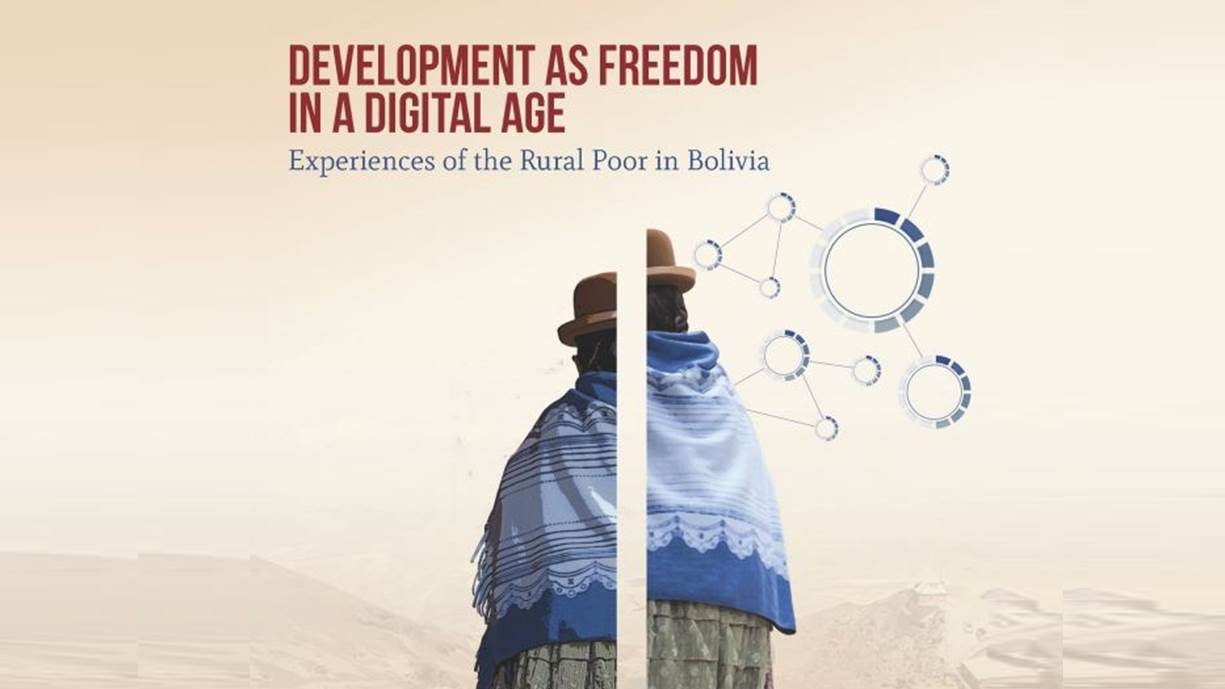A book launch sponsored by: World Bank Group’s Governance Global Practice, Social, Urban, Rural and Resilience Global Practice; Transport and ICT Global Practice; Gender Cross-Cutting Solution Area, Global Partnership for Social Accountability; Bolivia Country Management Unit; and the Leadership, Learning and Innovation Vice-Presidency.
- What impact do new technologies (ICTs) have on the well-being of poor communities?
- Can ICTs strengthen social accountability and enhance the inclusiveness of governments?
- Under which conditions can new technologies empower marginalized groups, in particular indigenous peoples?
- How can we evaluate the impact of ICTs from a human development perspective?
The session will present the findings from the new book Development as Freedom in a Digital Age and discusses how to apply Amartya Sen’s ‘Capability Approach’ to evaluate the impact of ICTs on development. Based on empirical evidence from rural Bolivia, the book concludes that enhancing poor people’s informational capabilities is the most critical factor for determining the impact of ICTs on poverty and human development.
Opening Remarks:
Hassane Cisse | Director, Governance and Inclusive Institutions | World Bank Group
Varinia Daza | Adviser to Executive Director | Government of Bolivia
Overview:
Bjorn-Soren Gigler | Sr. Governance Specialist and author, Governance Global Practice | WBG
Voices from the field: (connecting via VC from Bolivia)
Maria Eugenia Choque |Vice President, United Nations Permanent Forum on Indigenous Peoples
Xavier Albó |Anthropologist and Co-Founder of CIPCA, Bolivia
Andrea Flores |Director, Organization of Aymara Women of the Kollasuyo, Bolivia
Moderator: Faris Hadad-Zervos |Bolivia Country Manager | World Bank Group
Panel Discussion:
Jane Fountain |Distinguished Professor and Director of NCDG | UMass Amherst
Kevin Healy |Professor, Center of Latin American Studies | Georgetown University
Jeff Thindwa |Practice Manager, Governance Global Practice | World Bank Group
Eve Sandberg |Chair, Politics Deptment | Oberlin College
Moderator: Caren Grown | Sr. Director, Gender Cross-Cutting Solution Area | World Bank Group
Closing remarks:
Randeep Sudan | Practice Manager, Transport and ICT Global Practice | World Bank Group
About the Book:
This study designs an alternative evaluation framework (AEF) that applies Sen’s capability approach to the study of information and communications technologies (ICTs) in order to place people’s well-being, rather than technology, at the center of the study.
The AEF develops an impact chain that examines the mechanisms by which access to, and meaningful use of ICTs can enhance people’s “informational capabilities” and improve people’s human and social capabilities. This approach thus uses people’s individual and collective capabilities, rather than measures of access or use, as its principal evaluative space.
Based on empirical evidence from indigenous communities’ use of new technologies in rural Bolivia, the study concludes that enhancing poor people’s informational capabilities is the most critical factor determining the impact of ICTs on their well-being. Improved informational capabilities, like literacy, do enhance the human capabilities of poor and marginalized peoples to make strategic life choices and achieve the lifestyle they value.
